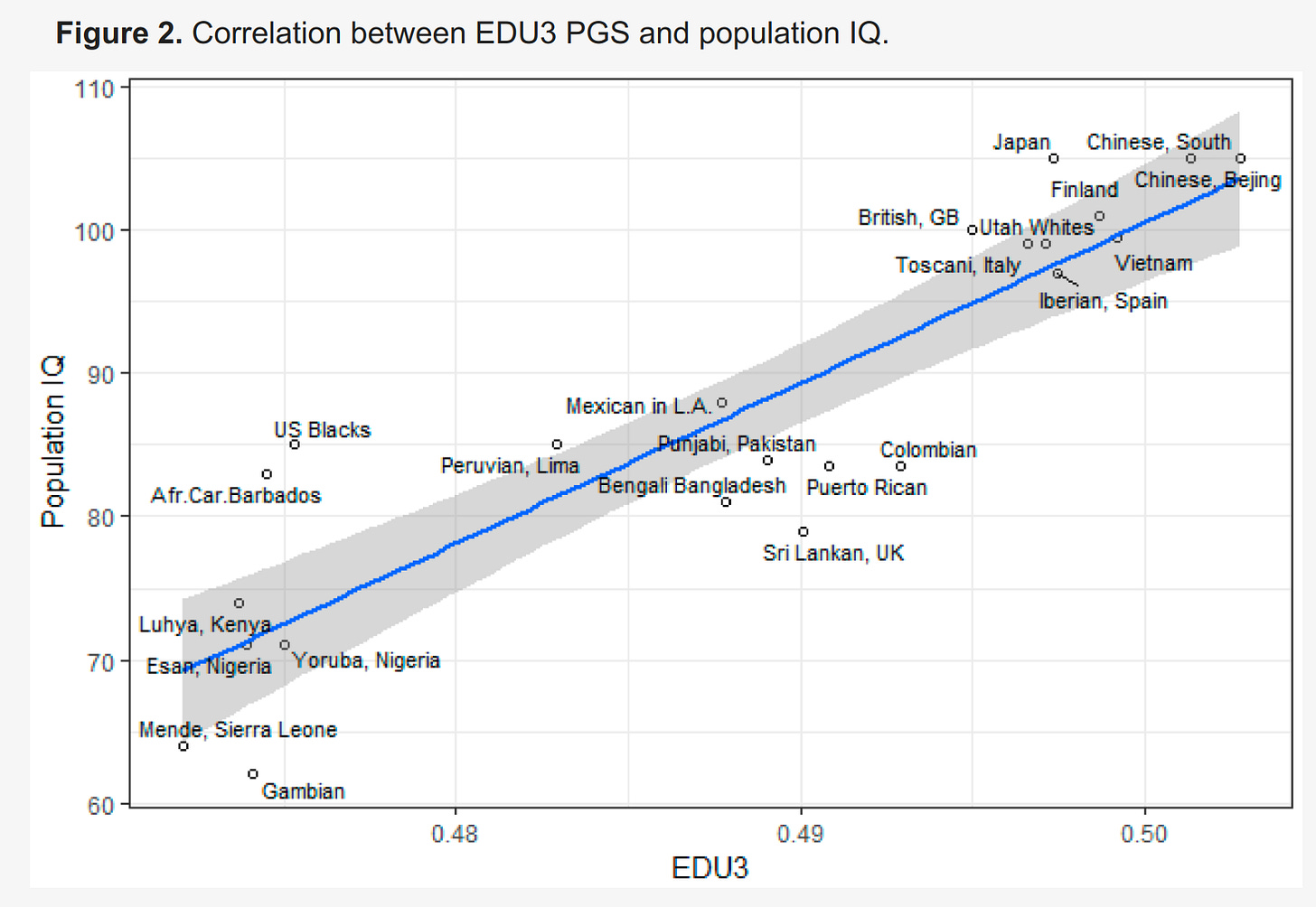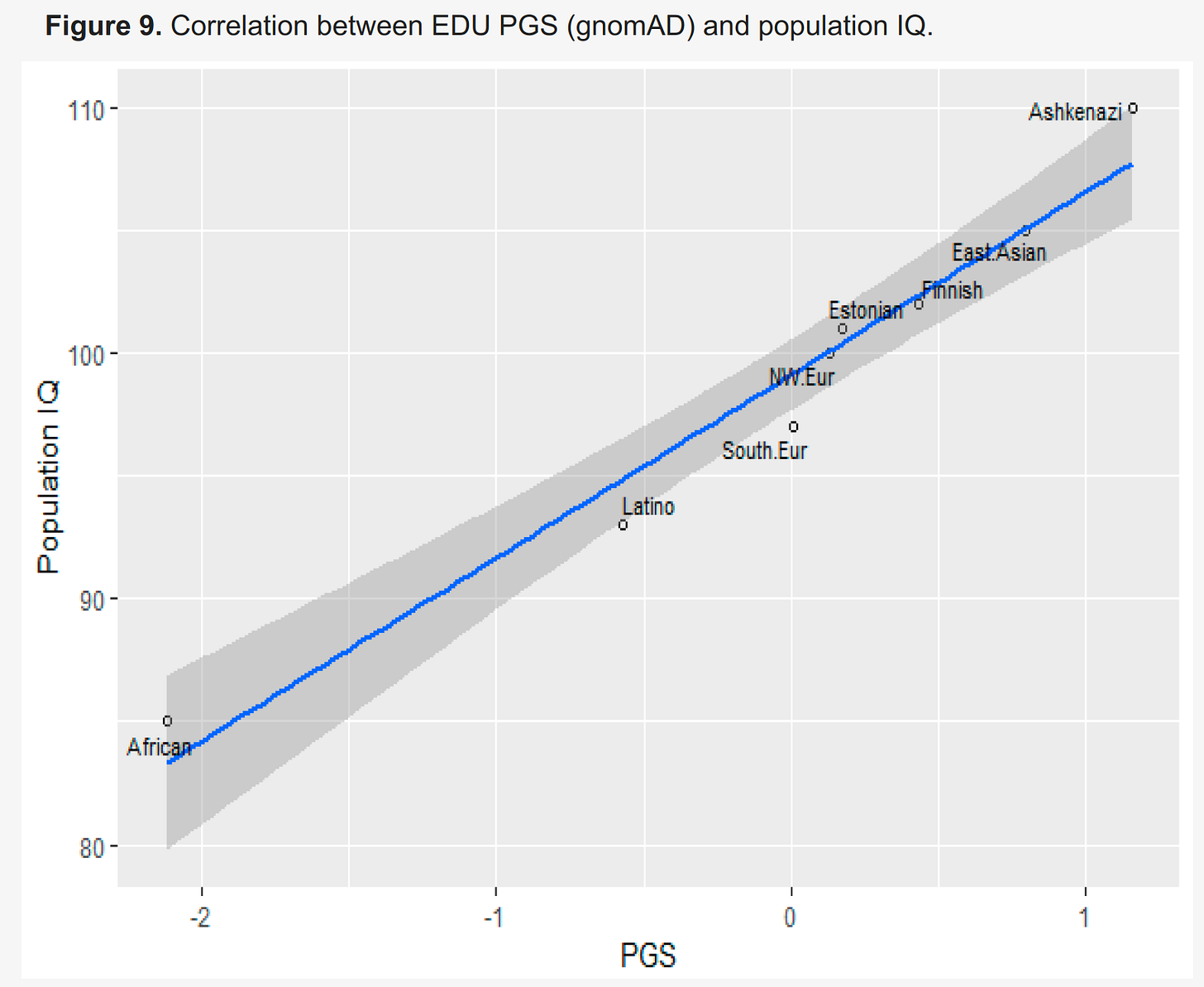Bayesian hereditarianism
Expanding upon Sean Last's 2023 post
In august 2023, Sean Last wrote an important post that didn't receive enough attention. His point was that model comparisons are not correctly (Bayesically) applied in the hereditarianism vs. egalitarianism debate. There's a lot of evidence concerning this topic, but models are not evaluated as they should be. His point is that one can posit a vague agnostic or environmentalist model which can potentially accommodate just about any finding with new post-hoc claims. For instance, hereditarianism makes strong predictions concerning the slope of admixture regression, namely, that these should be large enough to account for a large proportion of the observed gap. So if the question concerns African Americans and European Americans, who differ 0.80 in African (and European) ancestry on average, a slope of 15 IQ would imply that if counter-factually African Americans were magically given 100% European ancestry, their IQ would increase by 15 * 0.8 = 12 IQ. Since the gap is ~15 IQ, this would mean that ancestry explains 12/15 = 80% of the gap. If we define hereditarianism for this question as being that genetics explains 50-100% of the gap, only slopes with values between 9.4 and 18.8 IQ are possible. Strict egalitarians would predict a slope of 0, sampling error aside. Flexible egalitarians would predict a slope just about any value because one can always claim that even though the ancestry slope works out the way hereditarians predicted it would, this is actually caused by skin color discrimination, legacy of slavery, housing regulations etc.
However, in Bayesian reasoning, when we compare models, we must take into account both their prior probability and how well they predict the evidence we found. We have by now estimated a few slope values for this research question, all of which were large and within the hereditarian prediction range, and outside the range of strict egalitarians. This increases the posterior probability of the hereditarian model compared to the egalitarian models, even though the flexible egalitarian model can accommodate the findings. To succeed as a scientific model, the model most assign some values to be more likely than others, and these should be generally observed. A magic theory of the universe can accommodate just about anything we might observe, so it is a bad theory. This flexible egalitarian model is really just an agnostic model that predicts nothing in particular and attempts to come up with a new model only after seeing the results.
Sean Last did not provide a numerical example of this, so I've decided to make one. For this, we will be concerned with the correlations of group-level polygenic scores for education/intelligence and their observed means. The predictions for 3 models are roughly:
Hereditarianism: correlations should be positive and strong, say, 0.5 to 1.
Egalitarianism: correlations should be near 0.
Agnosticism: correlations are just as likely to be any value from -1 to 1.
Visually, they could look like this:
The somewhat odd shapes have to do with my attempt to find a statistical distribution for each of these models. This could be improved upon for hereditarianism (it's a beta distribution with some stretching to cover the full range).
What about the observations we have made so far? By my count, there are 3 independent results, which are:
First, in the 1000 genomes dataset (Piffer 2019, figure 2), there are about 23 populations with paired IQ scores. The correlation is:
r = 0.89.
Second, in the GNOMAD dataset (Piffer 2019, figure 9), there are 8 populations and their IQs:
r = 0.98.
Third, in the ABCD (Fuerst et al 2023, figure 8a), there are 30 ethnic groups in the USA with IQs from the same study:
r = 0.90.
For each of these studies, one could have chosen alternative findings using different polygenic scores or IQ estimates etc., but to avoid complications, I will use these.
Next up, we can compare the model probabilities before and after observing these 3 correlations:
Charitably, the models are given even odds initially, so each model has ~33% chance of being true before seeing the data (the prior). After seeing the data, egalitarianism has ~0% chance of being true (as it predicts the values we saw to be incredibly unlikely), agnosticism ('flexible egalitarianism') retains about 20% probability, and hereditarianism has increased to ~80% probability.
To do a full comparison of the models, one would proceed to do similar math for other findings, such as the admixture regression slopes we discussed above. There are a number of independent and semi-independent admixture regression results (PING Kirkegaard 2019, PNC Lasker et al 2019, online samples Warne 2020, ABCD Fuerst et al 2023), so the situation is more complicated to calculate but would also strongly favor hereditarianism given that all the values estimated fall in the high probability region (8-20 IQ). E.g. in Fuerst 2023, the Black-White gap was 1.08 d or 16.2 IQ, the slope was ~17 IQ meaning that about 100% was explained by genetics).
Or take the Jensen method results (method of correlated vectors). Many studies have found that there is a second-order positive manifold such that tests with higher g-loadings show larger group gaps, larger correlations with ancestry, higher heritabilities, and null-to-negative correlations with Flynn effect gains. This pattern of results is expected by hereditarianism, but not by egalitarianism, which can either pivot to an 'anything goes' agnostic stance, or predict 0's. Either way, it faces the same problem as above. To succeed as a scientific theory, egalitarianism must strongly predict findings that are seen, and make predictions that diverge from the predictions of hereditarianism in some empirically testable way. Given the complete failure of this research program to do so since the early 1900s, it must receive a very poor score in a Bayesian model comparison. In other words, it is a degenerate research program, and hereditarianism is a progressive one.







The hereditarian hypothesis is falsifiable in the Popperian sense. If, for example, your studies of racial admixture's correlation with IQ had reported the reverse findings, then the hereditarian hypothesis for racial differences in IQ would have been toast. The flexible egalitarian hypothesis is not good Popperian science. But it's also not necessarily wrong. E.g., the Flynn Effect was pretty unexpected and we still aren't too sure what all the causes of it are. So, it could turn out there might be environmental reasons that we haven't begun to conceive of, much less to measure. But that's pretty weak science
The bottom line is that egalitarians refuse to accept reality.